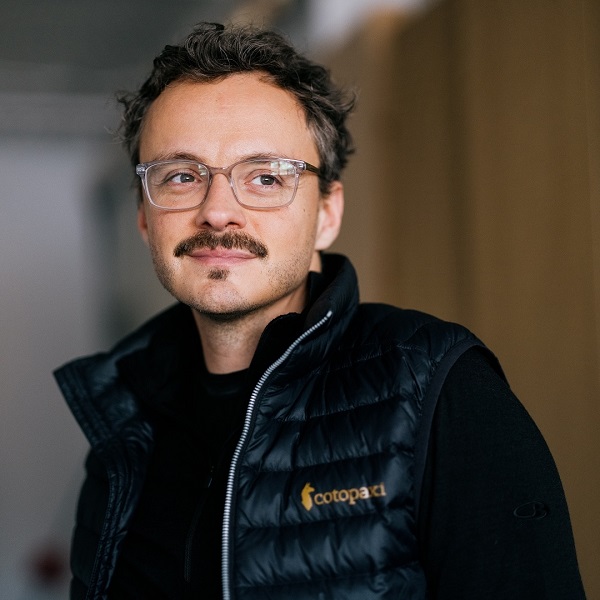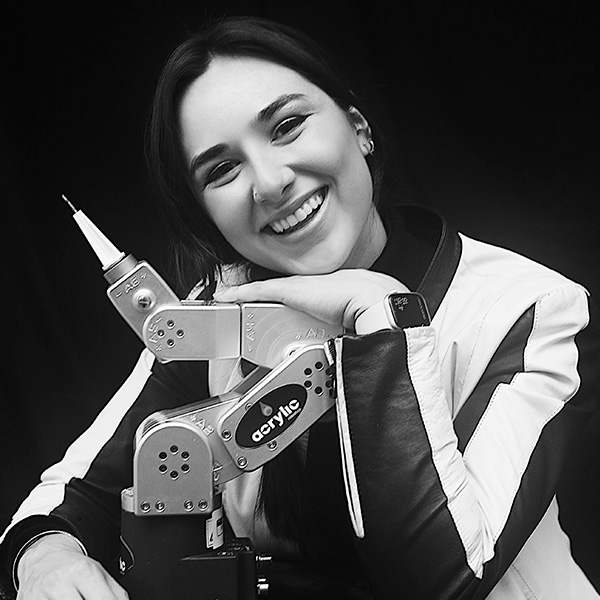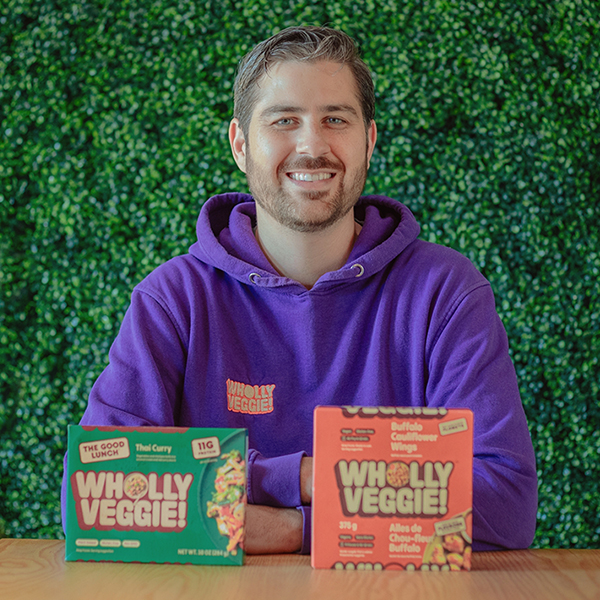A recent story in the business publication Inc. recounts what surely must have been one of the greatest moments in Dave Segal’s life.
The inventor was on stage at the Edison Awards, a high-profile event in tech circles at which some of the world’s most innovative minds are recognized for their breakthroughs. The audience included several prominent scientists and business leaders, including the president of SpaceX and the director of NASA’s Jet Propulsion Lab.
Segal was there to talk about his brainchild, the Naqi Neural Earbuds. The earbuds, a human-machine interface system, allow users to operate computers and other digital devices with subtle head or face movements. The devices were designed to improve the lives of individuals with major disabilities.
Another man, William Smith, joined Segal on stage. Smith, who is paralyzed from the neck down, demonstrated how to use the Naqi earbuds, easily selecting and ordering a football jersey online from Amazon. According to Inc., “gasps and cheers went up from the crowd.”
Segal took home a gold medal in the Edison Awards’ Social & Cultural Impact category. A year earlier, his earbuds were named among the best inventions of 2023 by Time. There’s a very good chance that none of that would have happened if Segal hadn’t met Mark Godsy, LLB’82, an entrepreneur with a long track record of partnering with scientists and innovators.
“The key question for me isn’t how much money is this going to make for us. It’s what kind of impact could this have on the world.”
Mark Godsy, an entrepreneur specializing in tech and biomedical companies
“He had been knocking on doors for eight years, going to venture funds and [investment] forums and approaching anyone who might take a meeting with him and put up money for this idea,” says Godsy of Segal. While Segal had an intriguing concept, he didn’t have the kind of track record or CV that made him look like a safe bet.
“When I met him, he said, ‘I’ll work for free if you’re willing to take this on because this is so important I don’t want this thing to die on the vine,’” recalls Godsy. Segal’s work on the earbuds has been driven by his desire to improve the lives of people with disabilities, people like one of his friends, a quadriplegic.
So why did Godsy listen to Segal when others took a pass? Why did he become partners with Segal and co-found Naqi Logix with him (Godsy is the company’s CEO and chairman)?
“When I meet an inventor who has, maybe, taken out a big mortgage on his house [to support an idea], someone who has tried and tried to make something happen, I think, ‘This person is incredibly passionate about something and I want to know why,’” says Godsy. “When someone is that committed to something, I’m sympathetic to that.”
Naqi Logix isn’t Godsy’s first rodeo. He has co-founded companies that produced medical devices (Angiotech Pharmaceuticals) and power control technology used for electric motors and electric vehicles (Exro Technologies).
The first company he co-founded, ID Biomedical, specialized in vaccines and was created in collaboration with researchers from UBC. It became the fifth largest vaccine company in the world and was purchased by GlaxoSmithKline in 2005 for $1.7 billion.
Including Naqi, he is currently involved with three companies he has co-founded, all still in their early stages. He is the CEO of Shackelford Pharma, which is based on the expertise of a Harvard-trained internist and researcher who has done extensive work on the potential benefits of cannabinoid-based treatments for conditions such as epilepsy. Godsy is also the chairman of Sky Scout Ai, which is developing a monitoring system that uses drones and artificial intelligence to detect wildfires at their earliest stages.
The businesses are all very different, but Godsy sees a common thread.
“[Each company] is about a particular problem that we’ve set out to solve,” says Godsy. “The key question for me isn’t how much money is this going to make for us. It’s what kind of impact could this have on the world.”
Godsy has now played a key role in starting several companies and he’s happy enough to move on once he feels they can do fine without him. The business pages are littered with examples of CEOs who built successful companies then overstayed their welcomes, damaging their own reputations (and often the companies) in the process.
“I’ve watched those [types of situations], where people sort of wrap themselves around a company axel and they’ll hang on for dear life and their claws are stuck into everything. I’ve always been challenged by that kind of behaviour,” says Godsy.
“If you view yourself, as I do, as a steward of these companies or these technologies or these potential solutions, then that sense of ownership really doesn’t take root.”
The fun part of a business venture for Godsy is the beginning.
“To me, the whole process of creating something with a group of people, it’s an amazing experience. I love watching people grow and I love helping to nurture that,” says Godsy.
“I’m not at all a control person. I try to build flat organizations where everyone feels appreciated and respected. I’m not crazy about somebody standing half an inch away from someone else and telling them how the world works,” says Godsy. “I think business is very much a collaborative process and it’s really where the best ideas win, so you want to create a dynamic where ideas can be curated and shared and acted on.”
While Godsy only practiced law for about five years before pivoting into business, he remembers receiving his acceptance letter to study law at McGill as a life-changing moment.
His father had passed away while Godsy and his brother were still young. His mother worked hard to raise them on her own. It wasn’t easy.
“I learned early on about struggle,” says Godsy. “When you’re in school, you notice that you don’t have the best clothes and you don’t have all the right things, you sort of feel stuck and you don’t have a normal family that goes out for dinner and things like that. You feel a little bit like an outsider.”
He called his mother as soon as he received that acceptance notification from McGill. “It represented security for our family, for my mom and for my younger brother.” Years later, he paid tribute to the sacrifices that his mother made by creating the Margaret “Peggy” Godsy Entrance Scholarship for McGill law students, with preference given to students “who have demonstrated compassion through their extracurricular activities, their service to the community, or their role as caregivers.”
Godsy now sits on the Faculty of Law Advisory Board and even if he is not a practicing lawyer, he’s grateful for the education he received there. “Having that background in law is super helpful in the work that I do.”
Shackelford Pharma has had preliminary discussions with the Food and Drug Administration in the U.S, about filing an IND (investigational new drug) application for its first drug, one that focuses on seizure disorders. “We’re ready to take the drug candidate into the clinic to prove it can do the things we believe it can do,” says Godsy. “We think we have an opportunity to make a huge dent in epilepsy.”
SkyScout Ai recently entered into a collaborative agreement with SenseNet, a company with a similar focus but a different approach that uses sophisticated sensors. “Rogers just did a deal with them, and they’ll be putting [the SenseNet sensors] up on cell towers,” says Godsy. “Our deal with SenseNet calls for our drones to go out and confirm what their sensors have identified. And then, in certain circumstances, our tanker drones can go out and actually deal with a fire.”
Those tanker drones will be equipped with CitroTech, a liquid fire retardant approved by the Environmental Protection Agency in the U.S. (SkyScout acquired the Canadian rights for the product). The company also recently hired a new CEO, Kristina Marsden, a former senior executive at Conair Aerial Firefighting. The company is discussing the possibility of pilot projects with the Government of Saskatchewan. “Forty per cent of [that province] is forested,” notes Godsy.
As for Naqi, Godsy says, “We’re now in the throes of really commercializing it.” The company is looking for manufacturing partners and recently added Samsung veteran Sandeep Arya as its chief business officer. “There are literally hundreds of companies that have expressed interest in doing something with this,” says Godsy.
“It’s been close to four years to get to where we are right now, from the day I met [Dave Segal]. He’s a very happy guy these days.”


